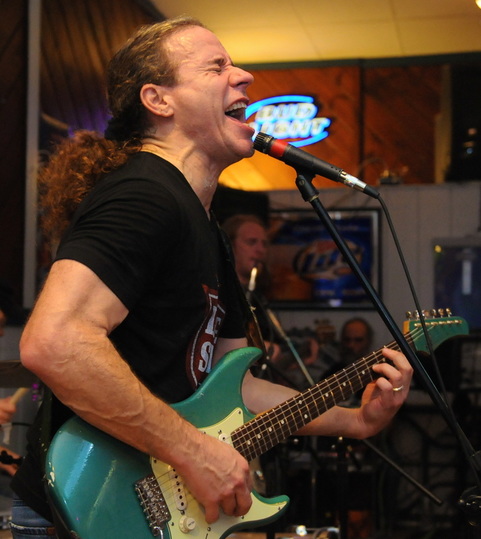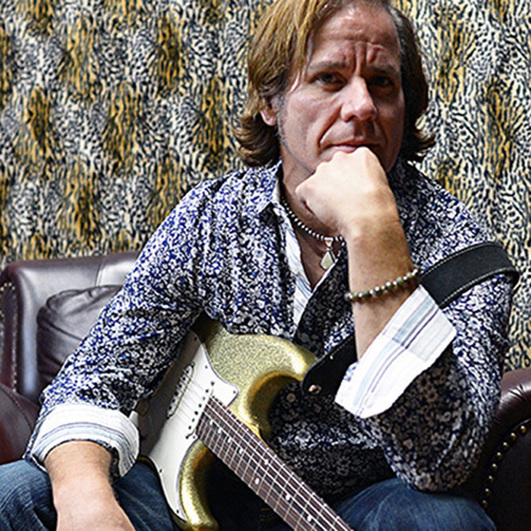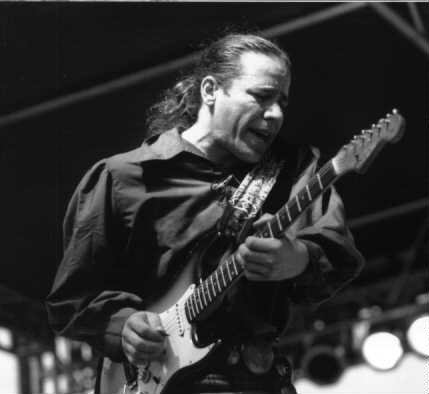
Chris Duarte, interview by Thomas McGregor
Austin Texas is thriving with many different styles of music. But nothing says Austin like some raging, crazy-good blues guitar. Well look no further. Our exclusive interview with blues guitarist and songwriter Chris Duarte will inspire you and get you in the blues rockin’ mood that goes great with the warm Summer months that are heading our way.
Thomas: How did you get started specifically playing the guitar?
Chris: It all started when I was a little boy, I saw the fiddler on the roof. I wanted to play the violin and when I went back to school I asked to play the violin and they said no. They said you can play the clarinet, so I went back home to my mom and told her that they wanted me to play the clarinet. So she made the decision and that was it for a while. That's kind of how to pick up playing music. Then my older brother got a guitar, I started picking it up in the rest is history.
Thomas: Was there a lot of music in your life growing up, did anyone play?
Chris: No we really didn't have anyone who played my older brother and I started playing around the same time. My mom was a big music fan and she was really into country so that was always around.
Thomas: Was there anything musically or creativity from your grandparents?
Chris: No not musically, more like morally they really helped calibrate my moral compass, they always seemed to just do the right thing.
Thomas: How have that serve you in the music industry? It could be brutal.
Chris: The industry has become very competitive, if you have a strong mind try not to let it bother you too much, maybe it won't get under your skin but that's not to say it hasn't cracked through a couple of times. You really have to stay focused, you really have to want this to keep going.
Austin Texas is thriving with many different styles of music. But nothing says Austin like some raging, crazy-good blues guitar. Well look no further. Our exclusive interview with blues guitarist and songwriter Chris Duarte will inspire you and get you in the blues rockin’ mood that goes great with the warm Summer months that are heading our way.
Thomas: How did you get started specifically playing the guitar?
Chris: It all started when I was a little boy, I saw the fiddler on the roof. I wanted to play the violin and when I went back to school I asked to play the violin and they said no. They said you can play the clarinet, so I went back home to my mom and told her that they wanted me to play the clarinet. So she made the decision and that was it for a while. That's kind of how to pick up playing music. Then my older brother got a guitar, I started picking it up in the rest is history.
Thomas: Was there a lot of music in your life growing up, did anyone play?
Chris: No we really didn't have anyone who played my older brother and I started playing around the same time. My mom was a big music fan and she was really into country so that was always around.
Thomas: Was there anything musically or creativity from your grandparents?
Chris: No not musically, more like morally they really helped calibrate my moral compass, they always seemed to just do the right thing.
Thomas: How have that serve you in the music industry? It could be brutal.
Chris: The industry has become very competitive, if you have a strong mind try not to let it bother you too much, maybe it won't get under your skin but that's not to say it hasn't cracked through a couple of times. You really have to stay focused, you really have to want this to keep going.

Thomas: What have you seen change in the music industry over the years?
Chris: The most obvious change for me since I've been growing up, is the way they promote music. There were people in each region that would meet up with you on the road and take you to radio stations. Record companies would offer that, they would take you to radio stations, they would do interviews. All those people went away and that changed when the when the internet got more involved, people started to share files on the internet, the accessibility of music piracy of music it goes on and on. Music has changed so much I don't think we have enough time to discuss it all.
Thomas: Do you think the changes in the music industry has helped, or hindered musicians?
Chris: I think it goes both ways, like being able to set up your own site and selling your music online - the accessibility to your music is great. The way I think it's hindered musician is that there is so much out there that people can get lost in the sheer magnitude of it all. Also touring has kind of dried up, promotion has dried up, and musicians have to kind of take that upon themselves and a lot of us can't do that.
Thomas: Do do you think that for the consumer it's easier to find new music online, or is it simply just overcrowded?
Chris: I think it has made it easier to find new music on your Spotify iTunes and all of that out there. It has turned into a buyers’ market, and some people think they don't have to pay. I don't know where they got their entitlements or why they think they can take someone's work and effort and not pay anything for it. I'm not saying it’s everybody because plenty of people do pay. I think that the people that don't want to go out and see live music and just want to listen to it on their phone or whatever, have some kind of sense of entitlement that it's free. On the other hand some people just need their music to get out there. So if someone's taking the music and spreading it for free, then that's great for them but later down the line that's not what they need.
Chris: The most obvious change for me since I've been growing up, is the way they promote music. There were people in each region that would meet up with you on the road and take you to radio stations. Record companies would offer that, they would take you to radio stations, they would do interviews. All those people went away and that changed when the when the internet got more involved, people started to share files on the internet, the accessibility of music piracy of music it goes on and on. Music has changed so much I don't think we have enough time to discuss it all.
Thomas: Do you think the changes in the music industry has helped, or hindered musicians?
Chris: I think it goes both ways, like being able to set up your own site and selling your music online - the accessibility to your music is great. The way I think it's hindered musician is that there is so much out there that people can get lost in the sheer magnitude of it all. Also touring has kind of dried up, promotion has dried up, and musicians have to kind of take that upon themselves and a lot of us can't do that.
Thomas: Do do you think that for the consumer it's easier to find new music online, or is it simply just overcrowded?
Chris: I think it has made it easier to find new music on your Spotify iTunes and all of that out there. It has turned into a buyers’ market, and some people think they don't have to pay. I don't know where they got their entitlements or why they think they can take someone's work and effort and not pay anything for it. I'm not saying it’s everybody because plenty of people do pay. I think that the people that don't want to go out and see live music and just want to listen to it on their phone or whatever, have some kind of sense of entitlement that it's free. On the other hand some people just need their music to get out there. So if someone's taking the music and spreading it for free, then that's great for them but later down the line that's not what they need.

Thomas: Why do you think it’s changed now, when did people start thinking that music should be free?
Chris: I'm not sure, in my humble opinion I think it could be the rebellious side where virility and life and other stuff started moving into the mainstream. Drinking in loose living came more into the mainstream not saying that it wasn't in the classical world as well. When rock and roll came a really change society and realistically the world people started shaking their heads and being rebellious. I don't think people take you serious as a real musician unless you get some kind of credit and recognition in the mass media somehow.
Thomas: where did you first find the inspiration for your album lucky13?
Chris: I've worked with Mike for probably my last 7 projects. He's worked with some great guitar players. Anyways we were always under a time crunch, I'm always on the road and I would not always have time to write new material. So when I would meet with him I would have like 4 songs and I would just have to sit down and just really write. This album was no different. I always try to stretch my musical boundaries and sometimes it works out, and sometimes it fails miserably but I'm not afraid to keep trying. You always look for some kind of angle for marketing or some kind of angle for the radio.
Thomas: so you do look for a marketing angle when you go into a project?
Chris: Yes absolutely. When I would stop recording I would ask how long is that song so I could see if it’s short enough to get put on the radio. I like to keep my phone in radio format I don't want to put cuss words in it I don't need it to be too long, and I wanted to have a good hook to it, at least a couple of songs that have a memorable hook.
Thomas: Do you think some musicians don't think about the marketing angle, and that something that keeps you unique?
Chris: There's a group of musicians that will say this is my music, I play what I feel and I stay true to myself. There's definitely nothing wrong with that I admire people like that, I'm just trying to move my music long to become standard. If I get a song on the radio, more people will buy my music, more people will come out to see me. I do believe I maintain a level of integrity that I'm comfortable with I still have to wake up and look at myself in the mirror. If I'm lucky I'll be doing this year after year. For me Texas sugar is still my big song, but I love playing it i enjoy it. I believe I work with myself and stretch my boundaries and I'm enjoying it. Also on the other hand I believe that there is musicians out there that say we have to have a certain tempo, it has to be a certain style. The kind of go with what's popular and they're formulating a song that they believe will be successful and I don't think there's anything wrong with that also.
Thomas: what do you do to push yourself creatively, what do you do to get yourself outside your comfort zone?
Chris: You always have to try new things, I feel like I'm very lucky but I've always push myself to practice a lot. As an artist you really have to get out there and try these new ideas, some of those ideas you might make a lot of mistakes on but that's how you're going to learn. You have to expand about getting evolved as a musician, work on your craft. I have a couple of people that will follow me a couple of shows in a row, because they know this show won't be like the last one, all the songs won't be the same because I'm trying something different.
Chris: I'm not sure, in my humble opinion I think it could be the rebellious side where virility and life and other stuff started moving into the mainstream. Drinking in loose living came more into the mainstream not saying that it wasn't in the classical world as well. When rock and roll came a really change society and realistically the world people started shaking their heads and being rebellious. I don't think people take you serious as a real musician unless you get some kind of credit and recognition in the mass media somehow.
Thomas: where did you first find the inspiration for your album lucky13?
Chris: I've worked with Mike for probably my last 7 projects. He's worked with some great guitar players. Anyways we were always under a time crunch, I'm always on the road and I would not always have time to write new material. So when I would meet with him I would have like 4 songs and I would just have to sit down and just really write. This album was no different. I always try to stretch my musical boundaries and sometimes it works out, and sometimes it fails miserably but I'm not afraid to keep trying. You always look for some kind of angle for marketing or some kind of angle for the radio.
Thomas: so you do look for a marketing angle when you go into a project?
Chris: Yes absolutely. When I would stop recording I would ask how long is that song so I could see if it’s short enough to get put on the radio. I like to keep my phone in radio format I don't want to put cuss words in it I don't need it to be too long, and I wanted to have a good hook to it, at least a couple of songs that have a memorable hook.
Thomas: Do you think some musicians don't think about the marketing angle, and that something that keeps you unique?
Chris: There's a group of musicians that will say this is my music, I play what I feel and I stay true to myself. There's definitely nothing wrong with that I admire people like that, I'm just trying to move my music long to become standard. If I get a song on the radio, more people will buy my music, more people will come out to see me. I do believe I maintain a level of integrity that I'm comfortable with I still have to wake up and look at myself in the mirror. If I'm lucky I'll be doing this year after year. For me Texas sugar is still my big song, but I love playing it i enjoy it. I believe I work with myself and stretch my boundaries and I'm enjoying it. Also on the other hand I believe that there is musicians out there that say we have to have a certain tempo, it has to be a certain style. The kind of go with what's popular and they're formulating a song that they believe will be successful and I don't think there's anything wrong with that also.
Thomas: what do you do to push yourself creatively, what do you do to get yourself outside your comfort zone?
Chris: You always have to try new things, I feel like I'm very lucky but I've always push myself to practice a lot. As an artist you really have to get out there and try these new ideas, some of those ideas you might make a lot of mistakes on but that's how you're going to learn. You have to expand about getting evolved as a musician, work on your craft. I have a couple of people that will follow me a couple of shows in a row, because they know this show won't be like the last one, all the songs won't be the same because I'm trying something different.

Thomas: What is your favorite part of performing, what you look forward to most when you perform?
Chris: The very beginning of the gig, yeah there's a couple of songs that you can really get out there but it's the beginning that gets me excited. This is where I work, this I was what I was do, this is what I was do best, this is what i love. That's why I put up with driving hundreds and hundred of miles on my van. I deal with some bad pay, some weeks I don't make any money, I have to pay much guys. Sometimes I do be performances. I deal with that because I get to get up and create something amazing for people everyday and I love doing it, I've always wanted to this.
Thomas: Which out of these 3, performing, recording, and practicing which one really challenges you?
Chris: I would say performing because you really connect with the audience you're out there trying new things and it could really take you to another place. Recording, a couple weeks before I know I'm going to the studio, the way I listen to music changes because I think how are these tones, do they go there. My imagination goes wild in a different way. Practicing, is a measure of focus, you have to ward off the outside world. You can practice and practice and think play I think of got this, no you need to dig deeper and make sure your playing each note right. You focus until you've done everything right, I think what brings up the fortitude is practicing. Having the dedication to do that when you're tired or you want to just stretch out on, can you have to sit up and practice or compose. The studio helps you focus with trying to put ideas you have inside you out and put stuff together but it's not an easy thing to do. For me of take a lot of trial and error, some people can do that.
Thomas: What can fans look forward to this year, that they may not know about?
Chris: I'm currently working on a project of a song that I have written such a long time ago that I rarely play for fans. They ask what CD is that one on, oh that's not on a CD because I've never recorded it. I also have a new band since I moved back to Austin so that always changes up your sounds a little bit. I'm not sure what's out there on the horizon myself but I think it’s just me evolving and trying to get better and relentless touring.
Chris: The very beginning of the gig, yeah there's a couple of songs that you can really get out there but it's the beginning that gets me excited. This is where I work, this I was what I was do, this is what I was do best, this is what i love. That's why I put up with driving hundreds and hundred of miles on my van. I deal with some bad pay, some weeks I don't make any money, I have to pay much guys. Sometimes I do be performances. I deal with that because I get to get up and create something amazing for people everyday and I love doing it, I've always wanted to this.
Thomas: Which out of these 3, performing, recording, and practicing which one really challenges you?
Chris: I would say performing because you really connect with the audience you're out there trying new things and it could really take you to another place. Recording, a couple weeks before I know I'm going to the studio, the way I listen to music changes because I think how are these tones, do they go there. My imagination goes wild in a different way. Practicing, is a measure of focus, you have to ward off the outside world. You can practice and practice and think play I think of got this, no you need to dig deeper and make sure your playing each note right. You focus until you've done everything right, I think what brings up the fortitude is practicing. Having the dedication to do that when you're tired or you want to just stretch out on, can you have to sit up and practice or compose. The studio helps you focus with trying to put ideas you have inside you out and put stuff together but it's not an easy thing to do. For me of take a lot of trial and error, some people can do that.
Thomas: What can fans look forward to this year, that they may not know about?
Chris: I'm currently working on a project of a song that I have written such a long time ago that I rarely play for fans. They ask what CD is that one on, oh that's not on a CD because I've never recorded it. I also have a new band since I moved back to Austin so that always changes up your sounds a little bit. I'm not sure what's out there on the horizon myself but I think it’s just me evolving and trying to get better and relentless touring.